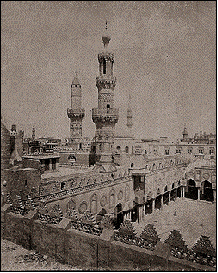
Back الإسلام في مصر Arabic الاسلام فى مصر ARZ Мысырҙа ислам Bashkir মিশরে ইসলাম Bengali/Bangla اسلام در مصر Persian Islam en Égypte French Islam di Mesir ID Islam di Mesir Malay Islamul în Egipt Romanian Ислам в Египте Russian

| Islam by country |
|---|
 |
|
|
Islam is the dominant religion in Egypt, with approximately 90% of Egyptians identifying as Muslims.[1] The majority of Egyptian Muslims are adherents of Sunni Islam,[2] while a small minority adhere to Shia Islam.[3] Since 1980, Islam has served as Egypt's state religion.[4] Due to the lack of a religious census, owing to the alleged undercounting of non-Muslim minorities in Egyptian censuses, the actual percentage of Muslims is unknown; the percentage of Egyptian Christians, who are the second-largest religious group in the country, is estimated to be between 5% and 10% of the population.[note 1]
A study at the University of Kent, citing a 2018 survey by Arab Barometer, stated that around 11% of Egyptians identified themselves as not religious. While in the same 2018 Wave survey, 47.2% of Egyptians said they were religious, 39.8% said they were somewhat religious and 10.4% said they were not religious.[5][6] In the same Arab Barometer 2018 Wave V survey it was reported that, 90.4% said they were Muslim, 9.6% said they were Christian, and 0.1% said they had no religion.[7]
Prior to the French campaign in Egypt and Syria under Napoleon Bonaparte, almost all of Egypt's educational, legal, public health, and social welfare issues were in the hands of religious functionaries. Under the Ottoman Empire, the public and political roles of the ulama (i.e., Muslim religious scholars) were reinforced, in an effective continuation of the policies of the Mamluk Sultanate. Traditionally, political divisions in the country were based on religious divisions.[8] During the 19th and 20th centuries, successive governments made extensive efforts to limit the role of the ulama in public life, and religious institutions were increasingly brought under closer levels of state control.
After the Egyptian Revolution of 1952, the new government assumed responsibility for appointing officials to mosques and Islamic schools.[9] Likewise, it mandated the reform of Al-Azhar University, beginning in 1961. These policies permitted department heads to be drawn from outside the ranks of the traditionally-trained orthodox ulama.
- ^ "Egypt". 11 September 2024.
- ^ "Egypt from "The World Factbook"". American Central Intelligence Agency (CIA). 4 September 2008.
- ^ Mohammad Hassan Khalil (31 January 2013). Between Heaven and Hell: Islam, Salvation, and the Fate of Others. Oxford University Press. p. 297. ISBN 9780199945412. Retrieved 30 May 2014.
- ^ An Independent Voice for Egypt’s al-Azhar? AHMED MORSY. 13 JULY 2011.
- ^ "Data Analysis Tool – Arab Barometer".
- ^ "Understanding Unbelief in Egypt - Understanding Unbelief - Research at Kent". Understanding Unbelief. Retrieved 23 February 2022.
- ^ "Data Analysis Tool – Arab Barometer". Retrieved 29 July 2022.
- ^ "Egypt". Berkley Center for Religion, Peace, and World Affairs. Archived from the original on 20 December 2011. Retrieved 14 December 2011. See drop-down essay on "Islamic Conquest and the Ottoman Empire"
- ^ "Al-Azhar University".
Cite error: There are <ref group=note> tags on this page, but the references will not show without a {{reflist|group=note}} template (see the help page).